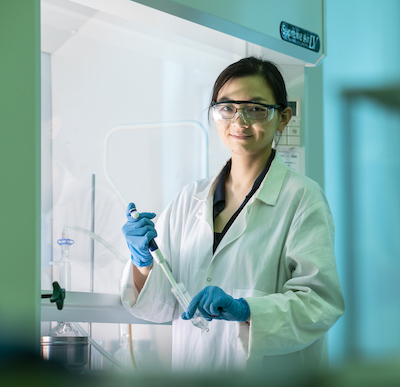In response to the evolving demands of the engineering industry, George Mason University's College of Engineering and Computing is launching four new graduate certificate programs, offering specialized training in burgeoning areas in engineering and computer science.

One of the new programs is the Microfabrication Graduate Certificate program, designed to address the growing demand for multidisciplinary training in the manufacturing sector.
Led by Mason mechanical engineering professor Pei Dong, this program will focus on practical training opportunities and is facilitated by Mason's new cleanroom facility, the Nanofabrication Facility on Mason’s Science and Technology Campus.
“Mason has demonstrated extensive expertise in this field for an extended period,” said Dong, whose research interests include the design and synthesis of advanced materials, as well as their applications in energy, water, and biomedical areas. “The new research facility now offers hands-on training opportunities for students, marking an exciting development. We believe the timing is perfect to launch the program.”
The space is the only cleanroom facility and resource for partners in Northern Virginia and offers interactive nanofabrication workforce training in groundbreaking research and emerging research applications that will accelerate growth of high-tech companies.
While the certificate program is designed to benefit Mason graduate students in engineering and science, Dong noted, those with a bachelor’s in a science, technology, engineering, or math (STEM) field from outside of the university can also enroll.
The program began in spring 2023, and it comprises four courses: Introduction to Nano-Materials, Nano Bio Sensors, Semiconductor Device Fundamentals, and Solid State Physics and Applications.
“I am thrilled about the four courses currently available to students,” said Dong. “The tremendous support from the Mechanical Engineering Department, Electrical and Computer Engineering Department, the Physics and Astronomy Department, and the cleanroom team, ensures that these courses offer comprehensive training from both engineering and science perspectives.”
In This Story
Related News
- January 7, 2026
- October 9, 2025
- September 14, 2025
- August 26, 2025
- March 25, 2025
